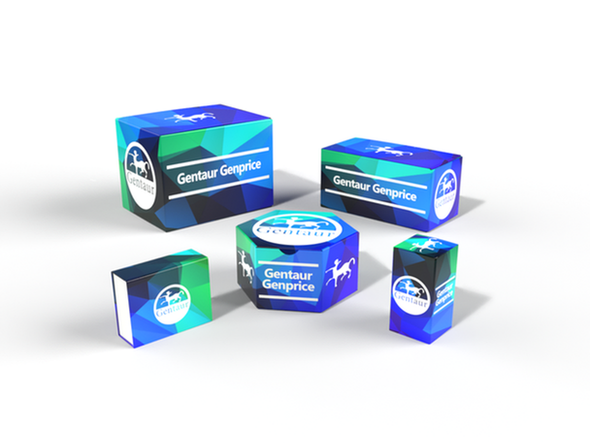Description
TMPRSS12 Antibody | 58-719 | Gentaur UK, US & Europe Distribution
Host: Rabbit
Reactivity: Human
Homology: N/A
Immunogen: This TMPRSS12 antibody is generated from rabbits immunized with a KLH conjugated synthetic peptide between 26-54 amino acids from the N-terminal region of human TMPRSS12.
Research Area: Cell Cycle
Tested Application: WB
Application: For WB starting dilution is: 1:1000
Specificiy: N/A
Positive Control 1: N/A
Positive Control 2: N/A
Positive Control 3: N/A
Positive Control 4: N/A
Positive Control 5: N/A
Positive Control 6: N/A
Molecular Weight: 39 kDa
Validation: N/A
Isoform: N/A
Purification: This antibody is purified through a protein A column, followed by peptide affinity purification.
Clonality: Polyclonal
Clone: N/A
Isotype: Rabbit Ig
Conjugate: Unconjugated
Physical State: Liquid
Buffer: Supplied in PBS with 0.09% (W/V) sodium azide.
Concentration: batch dependent
Storage Condition: Store at 4˚C for three months and -20˚C, stable for up to one year. As with all antibodies care should be taken to avoid repeated freeze thaw cycles. Antibodies should not be exposed to prolonged high temperatures.
Alternate Name: Transmembrane protease serine 12, 3421-, TMPRSS12
User Note: Optimal dilutions for each application to be determined by the researcher.
BACKGROUND: TMPRSS12 (transmembrane protease serine 12) is a 348 amino acid single-pass membrane protein that belong to the peptidase S1 family and contains one peptidase S1 domain. The gene that encodes TMPRSS12 consists of nearly 45, 000 bases and maps to human chromosome 12q13.12. Encoding over 1, 100 genes within 132 million bases, chromosome 12 makes up about 4.5% of the human genome. A number of skeletal deformities are linked to chromosome 12, including hypochondrogenesis, achondrogenesis and Kniest dysplasia. Noonan syndrome, which includes heart and facial developmental defects among the primary symptoms, is caused by a mutant form of PTPN11 gene product, SH-PTP2. Chromosome 12 is also home to a homeobox gene cluster, which encodes crucial transcription factors for morphogenesis, and the natural killer complex gene cluster, encoding C-type lectin proteins which mediate the NK cell response to MHC I interaction. Trisomy 12p leads to facial development defects, seizure disorders and a host of other symptoms which vary in severity depending on the extent of mosaicism.






